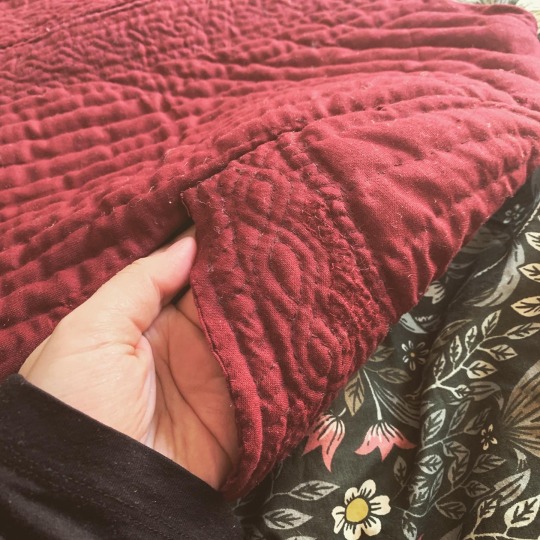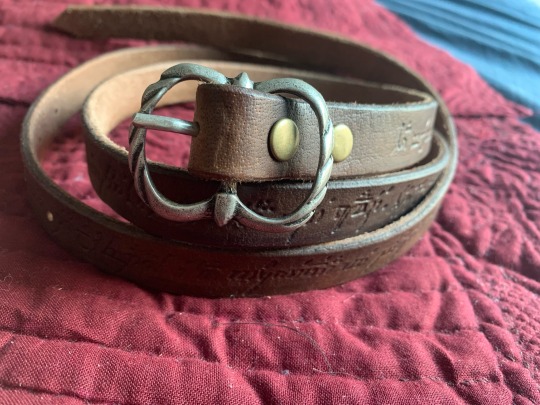#Oath of Feanor
Text
Y'all need to see this omfg this is so good holy shit I'm so normal about this
#it's a rubber#silmarillion#oath of feanor#feanor#curufinwe#tolkien appreciation post#jrr tolkien#tolkien#elves#flight of the noldor#noldor#silmarils#sons of feanor
2K notes
·
View notes
Text

…neither law, nor love, nor league of swords, dread nor danger, not Doom itself, shall defend him from Fëanor, and Fëanor's kin
Fate of the Silmarils and Oath of Feanor
Hand embroidery
799 notes
·
View notes
Text
be he mutual or following, be he a follower or stranger on dash unforeseen. this swear we all: boops we will deal him ere day's ending, paws unto fool's end!
373 notes
·
View notes
Text
does the Oath of Feanor work as a magical compulsion, or does it have magical properties, and are its consequences real?
yes, because the magic of Arda is also based on words of power, and it would be dissatisfying and limiting to assume that somehow that power doesn't work in this specific instance. no, because even if Feanor is the one speaking, not even his power could bend the fate of elves to that extent. yes, because the fate of any one people can be bent, delayed, or weirdly modified until an oath is fulfilled; in LOTR, the ghosts of the path of the dead prove it. no, because Manwe and Varda would not feel bound to enforce an oath of death with them as witnesses, and it goes against the rules of oathing. yes, because the enforcer is Eru, they just stand as witnesses and do not have the power to release the swearers as Eru would. no, because we don't even know if Eru accepted that oath. yes, because if the oath was invalid from the start, it would be beyond callous of Manwe and Varda not to inform the swearers and allow the consequences of the oath to happen. no, because a magical compulsion would remove or to an extent at least lessen responsibility of actions taken in its pursuit. yes, because the author of the story acknowledges a certain "will" of the oath by making it wake or sleep with active verbs. no, because even swearing without additional magic on top can feel like a compulsion to do things or to keep going that otherwise would not exist or not be felt by a given swearer. yes, because no matter what the everlasting darkness is or does, it can be real independently from any other prior compulsion to act; in other words, there may not be a magical property to the oath, but its called consequences for the swearers are very real. no, because there's several slightly different versions of the oath across the texts, and it's impossible to do a literal, word for word reading of its lines if it's possible to recite it slightly differently at a given time. yes, because the only valid version is the original pronounced by Feanor in Tirion, you can't wiggle out of that one. no, because who's to say that was recorded correctly, it's far too poetic for a sudden decision. yes, because who's to say that Feanor couldn't whip out all that via improvisation, I bet he could. yes, because other characters beyond the sons of Feanor treat the oath as something absolutely serious and real, and that includes Finrod in speaking to Andreth, when he says that Eru's name is not called upon even in jest, as well as Melian, when pointing out the strong forces awakened by involving that power. no, because neither of them can talk to Eru anyway. yes, because it's narratively more satisfying to imagine characters morally struggle against something that is eventually unbreakable and unavoidable like in any good tragedy. no, because it's narratively more satisfying to imagine characters do it to themselves and compromise with who they are out of family loyalty. yes, because the curse of Mandos actively turns it against the swearers into a betraying force, a consequence that wouldn't otherwise be a given, that is, nothing says that everything they start well would have finished badly and that the oath would have led them to defeat, and if it weren't magical before Mandos' addition, it is now. no, because Amrod's death in a draft would prove it breakable through his (admittedly only guessed) desire to turn back. yes, because he still died in the process, aka the everlasting darkness claimed him for being an oathbreaker. no, because how is it possible that it's simultaneously unbreakable and broken. yes, because the fate of arda and that of elves is inscribed within the eternal paradox of everything being predicted and everything being free will, and that will never be solved, neither regarding the fate of the elves nor the oath of Feanor. no, because the oath is a narrative device. yes, because the oath is a narrative device. three hundred more lines.
hope this helps. hope it doesn't. your pick.
242 notes
·
View notes
Text
fëanor gesturing to maedhros: this is my first baby. isn’t he just adorable? ☺️
maedhros, full grown kinslayer, heir to the King of the Noldor, traumatized and scarred from the confinement to the oath and the quest for the silmaril, is older than his uncle: i’m his baby
#it’s his baby!!!!#in honour of viggo mortensen’s bday who portrayed my fav babygirl in the series#besides frodo…#and elrond…#maedhros#tolkien#lotr#lotr memes#the lord of the rings#lotr fandom#incorrect tolkien quotes#silmarillion#silmarillion memes#incorrect lord of the rings quotes#incorrect silmarillion quotes#sons of feanor#oath of feanor#feanor
398 notes
·
View notes
Text



saw this and felt inspired
#and who else would i make this about than everyone's problematic faves#mom the feanorians are back at it#silmarillion#feanor#oath of feanor#kinslaying#(normal tags to add to a post)#silm memes#feener#jirtposting#tolkien memes
1K notes
·
View notes
Text

#sons of feanor#feanorians#oath of feanor#tolkien#lord of the rings#silmarillion#fantasy#lotr trop#jrr tolkien
263 notes
·
View notes
Text
Be he foe or friend, be she foul or clean, brood of Anti or bright Staff, Elda or Maia or Aftercomer, Man yet unborn upon Middle-earth, neither law, nor love, nor league of swords, dread nor danger, not Blocking itself, shall defend him from Fëanor, and Fëanor's kin, whoso liketh or rebloggeth, or in file saveth, finding shareth or afar queueth a Silmaril. This swear we all: boops we will deal them ere Day's ending, booping unto world's end! Our word hear thou, David Karp Allfather! To the everlasting Cancellation doom us if our deed faileth. On the holy mountain hear in witness and our vow remember, Manwë and Varda!
#april fools#boop#april fools day#boop o meter#the silmarillion#oath of feanor#feanor and feanor’s kin
132 notes
·
View notes
Text

Maglor WIP
#maglor#maglor fanart#silmarilion fanart#silmarillion#silm art#the silmarilion fanart#makalaure#kanafinwe#feanorians#oath of feanor
127 notes
·
View notes
Text
99 notes
·
View notes
Text

My almost finished Maedhros cosplay based on my very own design. Photo and edit by @thistlesandstories
The costume contains handsewn shirt (I used Lyocell instead of linen because it looks more elvish), cotton hand quilted vest with customised metal buckles, waist belt including the embossed Oath of Fëanor and wide belt adorned with Fëanorian stars made from polymer clay. The sword is a prototype made from EVA foam, but I want to make a less wrinkly one.
The bracers, the scabbard and the belt are all my own leatherwork. Details for nitpickers:




Makeup details:


#silmarillion#tolkien#the silm fandom#noldor#maedhros#the silmarillion#jrrtolkien#nelyafinwe#tolkien elves#tolkien cosplay#book cosplay#oath of feanor#feanorians#lotr cosplay#silmarillion cosplay#noldor elves#my cosplay#maedhros cosplay#cosplay makeup
320 notes
·
View notes
Text
107 notes
·
View notes
Text
Bear with me while I rules-lawyer the spirit of the Oath of Feanor because I'm pretty sure that's exactly what Maedhros did.
The Oath is specifically targeted at anyone who "hideth or hoardeth, or in hand taketh, finding keepeth or afar casteth a Silmaril" which I do not believe means anyone who touches a Silmaril, despite "in hand taketh" because all the other stipulations are targeted specifically at people who keep the Silmarils away from the Feanorians, by hiding, hoarding, keeping, or even throwing it far away. It would also just be bizarre if, say, a Feanorian follower returned the Silmaril to their lords and the Oath required that they kill them.
However, the strongest evidence for the Oath only applying (or being interpreted to only apply) to people who deliberately withhold the Silmarils from the Feanorians are Maedhros'/the Feanorians' actions before the 2nd and 3rd kinslayings: in both cases, they send a letter demanding the return of the Silmaril. Now, if by touching/posessing the Silmaril, the deaths of Thingol, Dior, and then Elwing are already demanded by the oath, why in the world would they send a letter (losing part of the element of surprise), not even to declare war, but demanding the Silmaril's return? Sending that letter implies that this can still be resolved peacefully if the Silmaril is handed over.
It's my interpretation that Maedhros/the Feanorians are rules-lawyering this tiny loophole in the oath (regardless of whether the oath is present magically/compulsive/just their own dedication) by deliberately closing their eyes to the fact that the current holder of the Silmaril definitely believes it to be their possession and is deliberately keeping it from the Feanorians---which lasts as long as that holder hasn't confirmed that desire.
After all, Thingol, Dior, and Elwing didn't steal the Silmaril, they received it from family members. If the Feanorians ignore the intent behind their keeping it (before that intent is confirmed by the holder's response to the Feanorian's demand), then they could consider Thingol et al to simply...coincidentally...happen to be holding a Silmaril, not possessing it for themselves and therefore not liable to the oath.
Actually, one line in the text from after Thingol refuses to return the Silmaril even hints that even after that, the situation might be salvageable if the Silmaril is returned by free will: "Celegorm and Curufin vowed openly to slay Thingol and destroy his people if they came victorious from war [this is pre-Nirnaeth], and the jewel were not surrendered of free will" (emphasis mine, Of the Fifth Battle, The Silmarillion).
Of course, the Oath drives the Feanorians to reclaim the Silmarils, and so I view the letters to Thingol, Dior, and Elwing as last-ditch attempts at solving this peacefully (via exploiting the above loophole). (Note: this is not necessarily meant to make the Feanorians more sympathetic, this is just me trying to figure out why they sent those letters.) However, this also dooms them to a kinslaying, because as soon as Dior and Elwing reject returning the Silmaril, they have explicitly or implicitly claimed it for themselves and have now "in hand taketh" the Silmaril instead of just touching it and happening to have it around, which means their deaths are now demanded under the Oath.
#I'm saying Maedhros / the sons of feanor because in the text#they seem to send the letters as a group especially to Dior#but the in the messages to Thingol and Elwing#Maedhros is slightly more singled out as the active party in sending/recieving messages + he's the head of the house#so I think he had the larger role here#the silmarillion#oath of feanor#maedhros#sons of feanor#feanorians#kinslaying#second kinslaying#third kinslaying#doriath#havens of sirion#thingol#elu thingol#dior#dior eluchil#elwing#softlysilver
34 notes
·
View notes
Text
#lord of the rings#lotr#tolkien#silmarillion#the silmarillion#feanor#alqualonde#first kinslaying#oath of feanor#sons of feanor#noldor#losgar#teleri
32 notes
·
View notes
Text
Their Oath Shall Drive Them and Yet Betray Them
When you run through the events of the Silmarillion, it’s glaring how consistently the Oath of Fëanor works against its own fulfillment.
One of Fëanor’s first acts after taking the Oath - not directly driven by it, but certainly driven by the same pattern of ‘I will kill anyone who stands between me and reclaiming the Silmarils’ - is the massacre of the Teleri and the theft of the swan-ships. This isn’t a necessary action to get to Middle-earth - it is simply the fastest, easiest, and most violent path.
But let’s say we set that aside, and look only at actions that are directly in service to the Oath.
For the four hundred years that Morgoth - their enemy, responsible for the deaths of their father and grandfather, supposedly the reason they swore the Oath in the first place - holds the Silmarils, the Fëanoreans make no attempt to reclaim the Silmarils.
But when non-Morgoth people even think about them, it is another matter entirely.
Celegorm and Curufin usurp the rule of Nargothrond, send Finrod and Beren to their deaths and deliberately abandon them once their capture is know, take Lúthien captive and attempt to forcibly marry her to Celegorm and rape her, and, after they are expelled from Nargothrond, attempt first to kill Beren and kidnap Lúthien, and then attempt to murder Lúthien (and nearly do murder Beren) after she has shown them mercy.
Now, Thingol didn’t want a Silmaril in the first place. He never expected Beren to retrieve one. The goal was for Beren to be daunted by the task and leave, never to return, or else to die in the attempt. And the Silmarils aren’t inherently something people are unwilling to give up (thanks to a recent essay for pointing this out) - Beren gives it to Thingol, a messenger brings it to Dior after Beren and Lúthien’s deaths, Elwing has it as an infant and no one surrounding her tries to take it for themselves, Elwing gives it to Eärendil. Aside from the incident of Thingol and the dwarves - which involves (in some versions cursed) dragon-treasure, which we know from The Hobbit has an ill effect on some people - people are mostly only unwilling to give it up to the Sons of Fëanor. With just cause!
If it wasn’t for the Kinslaying at Alqualondë, and especially for Celegorm and Curufin’s actions in Nargothrond - if there had never been an Oath - would it have been possible to negotiate with Thingol for the Silmaril? It might have cost a great deal, politically - it might have cost the recognition of Thingol as King of Beleriand - but if they could humble their pride that far, it wouldn’t have been out of the question.
And beyond that - without Celegorm and Curufin’s acts in service of the Oath, would both Nargothrond and Doriath have joined in the assault against Angband that was the Fifth Battle? Could they have won? Could they have, among other things, regained the other two Silmarils? It’s questionable (there’s still the issue of having to fight inside Angband, and fighting Morgoth himself, and of additional dragons…), but the narrative in the Silm does suggest a few moments in the battle when there was a chance.
And with later events, it becomes even clearer. Beren, and certainly Lúthien, don’t care a lot about the Silmaril for its own sake; if there was no grievance - if not for the Fëanoreans’ deeds of kidnapping, and attempted rape and murder, and treachery causing the death of Beren’s friend and Lúthien’s cousin, and on top of that, threatening to murder Lúthien’s father - wouldn’t there have been a pretty decent chance to reach an agreement where the Fëanoreans recieved it upon Beren and Lúthien’s deaths? Or wouldn’t they have had far better chances of negotiating with Dior for it? At every step motivated by the Oath, the Fëanoreans make enemies of the very people whose goodwill would be of most value to them.
And of course, after the Second Kinslaying, none if the refugees of Doriath have cause to guve the Fëanoreans the time of day, much less a Silmaril.
But it keeps going. We come to the end of the War of Wrath; the other two Silmarils are reclaimed from Morgoth by the Host of the Valar. Maedhros and Maglor demand them of Eönwë, and he tells them that they have lost all right to the jewels - because of their many and merciless deeds, and most of all because of their slaying of Dior and the assault upon the Havens.
For a long time I found the temerity of this demand from Maedhros and Maglor, and of their later theft of the Silmarils, unfathomable, coming as it did towards an army that had arrived beyond hope and saved their lives and the lives of everyone in Beleriand, an army arriving at the appeal of two people whose friends and home Maedhros and Maglor had slaughtered and whose children they had stolen. But in this context the theft becomes clearer. They are being told that the very atrocities that they took to regain the Silmarils - atrocities that they loathe - have in fact permanently barred them from regaining them. They have, in effect, been told that if they had not spent the past years violating their own consciences and turning their deeds to evil and murder, and if, indeed, they had spent all the years since the Nirnaeth doing sweet fuck-all about the Oath, they would now be rid of it and have the Silmarils. That’s devastating! They don’t want to have done those things! All their evil choices, all their regrets, have served only to cut them off from a goal that they could have otherwise achieved. Of course they cannot accept this. Of course they make a last attempt, and learn the truth of Eönwë’s statement.
They recieved a prophecy and a warning, and they ignored it, and it had come true at every turn. Their Oath shall drive them and yet betray them. At every moment in Beleriand when there is any chance of the Fëanoreans regaining a Silmaril, the single greatest obstacle standing in their way is the Oath itself.
284 notes
·
View notes
Text
Oath of feanor related question:
Why does everyone seemingly agree it's over with the end of the first age? Every post first age fanfic or headcanon I've seen so far treats the oath as over and done after mae and maglor got their respective rocks but one is still out there!! Being very much withheld from the feanorians. I don't remember a clause in the oath going "unless it's up in the sky ofc, that's too far away". (Mae even says they can't go to aman cause there they would be too close to the doors of night wich would make the oath stir up) I also don't see why their hroa being destroyed should nullify the oath. This has been going around in my brain for over a year now, ideas and discussion very much welcome (plz I need answers)
36 notes
·
View notes